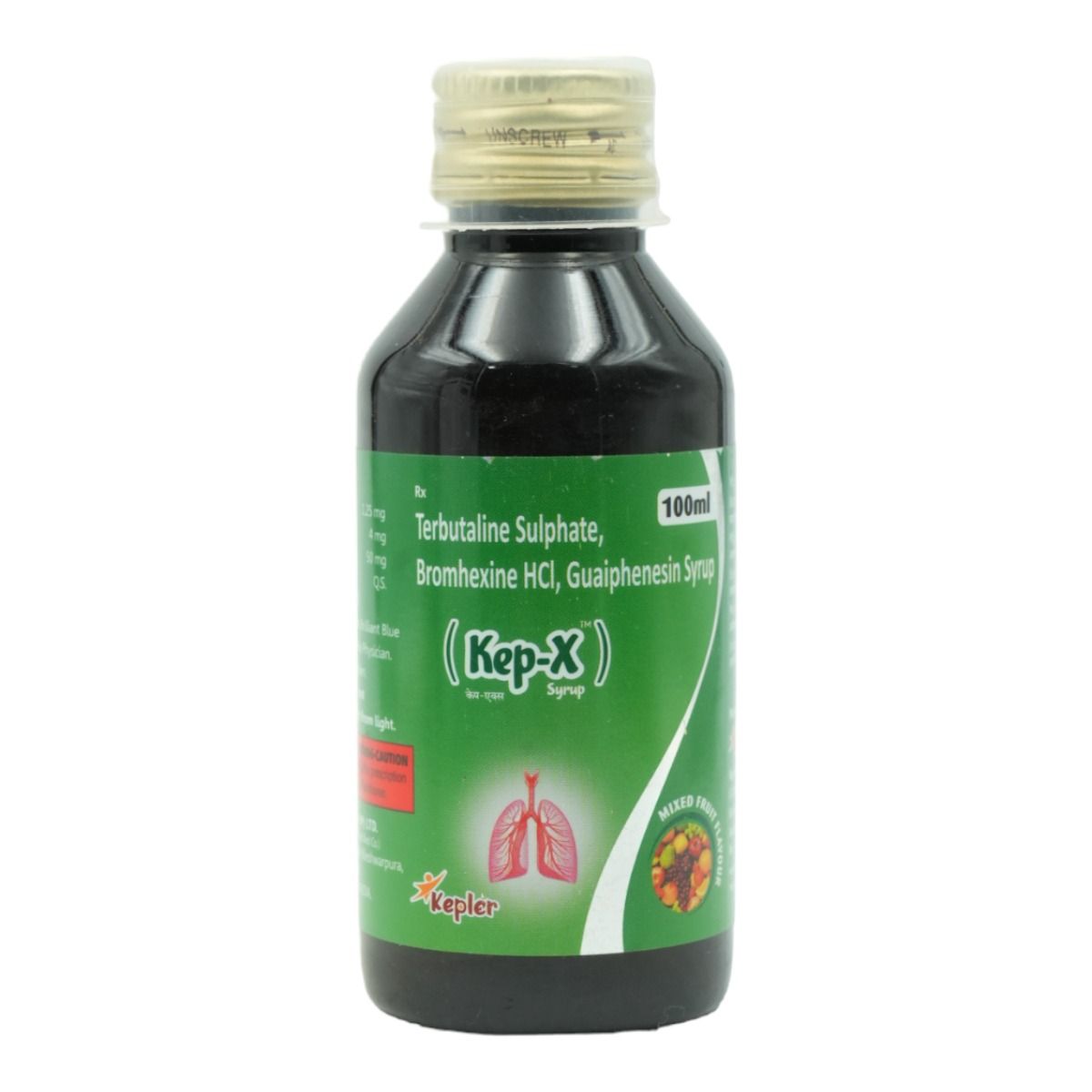Broncholik Syrup
₹41.4*
MRP ₹46
10% off
₹39.1*
MRP ₹46
15% CB
₹6.9 cashback(15%)
Free Delivery
With Circle membership
(Inclusive of all Taxes)
This offer price is valid on orders above ₹800. Apply coupon PHARMA10/PHARMA18 (excluding restricted items)
Know Your Delivery Time
Provide Delivery Location

Available Offers
Whats That

Secure Payment

India's Most Trusted Pharmacy

Genuine Products
About Broncholik Syrup
Broncholik Syrup is used to treat cough associated with mucus. Coughing (dry or productive) is the body’s way of clearing irritants (like allergens, mucus or smoke) from airways, thereby preventing respiratory infection. Cough has two types: dry cough and chesty cough. A dry cough means it's tickly and doesn't produce any vicious or thick mucus, while a chesty cough means mucous or sputum is produced to help clear your airways.
Broncholik Syrup is a combination of three drugs, namely Guaifenesin, Terbutaline and Bromhexine. Guaifenesin belongs to the class of expectorants that works by increasing the volume of fluid in the airways, reducing the stickiness of mucus and helping to remove it from the airways. Terbutaline belongs to the class of bronchodilators that relax muscles and widen the airways. Thus, it makes breathing easier. Bromhexine belongs to the class of mucolytic agents (cough/sputum thinner) that works by thinning and loosening phlegm (mucus) in the lungs, windpipe and nose. Thus, it helps cough out easily.
Use Broncholik Syrup as prescribed by your doctor. Some people may experience nausea, vomiting, drowsiness, headache, dizziness, skin rash, tremors, stomach upset and fast heartbeats. Most of these side effects of Broncholik Syrup do not require medical attention and gradually resolve over time. However, if the side effects persist or worsen, please consult your doctor.
Please tell your doctor if you are allergic to Broncholik Syrup or any other medicines. If you are pregnant or breastfeeding, it is advised to inform your doctor before using Broncholik Syrup. If you have a history of fits or are suffering from fits, please inform your doctor before taking Broncholik Syrup as it may increase the risk of recurrent fits. If you have diabetes, regular monitoring of blood sugar levels is recommended while taking Broncholik Syrup. If you have diabetes, fits, high blood pressure, overactive thyroid, stomach ulcers, phenylketonuria (a congenital disability that causes accumulation of amino acid, phenylalanine in the body), kidney, liver or heart problems, please inform your doctor before taking Broncholik Syrup.
Uses of Broncholik Syrup
Directions for Use
Medicinal Benefits
Broncholik Syrup is a combination of three drugs, namely Guaifenesin, Terbutaline and Bromhexine, used to treat a cough with mucus. Guaifenesin belongs to the class of expectorants that works by increasing the volume of fluid in the airways, reducing the stickiness of mucus and helping to remove it from the airways. Terbutaline belongs to the class of bronchodilators that relax muscles and widen the airways. Thus, it makes breathing easier. Bromhexine belongs to the class of mucolytic agents (cough/sputum thinner) that works by thinning and loosening phlegm (mucus) in the lungs, windpipe and nose. Thus, it helps cough out easily.
How Broncholik Syrup Works
Storage
Side Effects of Broncholik Syrup
- Nausea
- Vomiting
- Drowsiness
- Headache
- Dizziness
- Skin rash
- Tremor
- Stomach upset
- Fast heartbeats
What if I have taken an overdose of Broncholik Syrup
Drug Warnings
If you are known to be allergic to Broncholik Syrup or any other medicines, please tell your doctor. If you are pregnant or breastfeeding, it is advised to inform your doctor before using Broncholik Syrup. If you are suffering from fits (epilepsy) or have a history of fits, please inform your doctor before taking Broncholik Syrup as it may increase the risk of recurrent fits. If you have diabetes, regular monitoring of blood sugar levels is recommended while taking Broncholik Syrup. If you have diabetes, high blood pressure, overactive thyroid (hyperthyroidism), stomach ulcers/bleeding, phenylketonuria (a congenital disability with high protein in the body), kidney, liver or heart problems, please inform your doctor before taking Broncholik Syrup.
Drug-Drug Interactions
Drug-Drug Interactions
Login/Sign Up
Using Broncholik Syrup together with amisulpride can increase the risk of severe irregular heart rhythm.
How to manage the interaction:
Amisulpride and Broncholik Syrup can cause an interaction, but it can be taken if prescribed by a doctor. You should seek immediate medical attention if you develop sudden dizziness, lightheadedness, fainting, shortness of breath, or heart palpitations. Do not stop using any medications without talking to a doctor.
The combined use of Broncholik Syrup and Disopyramide can increase the risk of an irregular heart rhythm.
How to manage the interaction:
Co-administration of Broncholik Syrup and Disopyramide can lead to an interaction, it can be taken if advised by your doctor. However, if you experience any symptoms like sudden dizziness, lightheadedness, fainting, shortness of breath, heart palpitations, diarrhea, or vomiting, contact your doctor immediately. Do not discontinue any medications without first consulting your doctor.
Combining Broncholik Syrup and nilotinib can increase the risk of an irregular heart rhythm.
How to manage the interaction:
Taking Broncholik Syrup and nilotinib together can lead to an interaction, it can be taken if advised by your doctor. However, if you experience any symptoms like sudden dizziness, lightheadedness, fainting, shortness of breath, heart palpitations, diarrhea, or vomiting, contact your doctor immediately. Do not discontinue any medications without first consulting your doctor.
Using sotalol together with Broncholik Syrup may reduce the benefits of both medications since they have opposing effects in the body.
How to manage the interaction:
Taking Sotalol with Broncholik Syrup together can result in an interaction, but it can be taken if a doctor has advised it. Do not stop using any medications without a doctor's advice.
Taking Broncholik Syrup with ceritinib can increase the risk of irregular heart rhythm.
How to manage the interaction:
Although there is a interaction between Ceritinib and Broncholik Syrup, you can take these medicines together if prescribed by your doctor. However, consult your doctor immediately if you experience symptoms such as dizziness, lightheadedness, fainting, shortness of breath, or heart palpitations. Do not stop using any medications without talking to a doctor.
Taking Efavirenz and Broncholik Syrup can increase the risk or severity of irregular heart rhythms. The risk increases in patients with a history of heart illness or electrolyte imbalance.
How to manage the interaction:
Taking Efavirenz and Broncholik Syrup together can result in an interaction, it can be taken if your doctor has advised it. However, if you experience sudden dizziness, lightheadedness, fainting, shortness of breath, chest pain or tightness, rapid heartbeat, or memory loss, contact a doctor immediately. Do not discontinue any medications without consulting a doctor.
Taking Gatifloxacin and Broncholik Syrup can increase the risk or severity of irregular heart rhythms. The risk increases in patients with a history of heart illness or electrolyte imbalance.
How to manage the interaction:
Taking Gatifloxacin and Broncholik Syrup together can possibly result in an interaction, it can be taken if your doctor has advised it. However, if you experience sudden dizziness, lightheadedness, fainting, shortness of breath, chest pain or tightness, rapid heartbeat, or memory loss, contact a doctor immediately. Do not discontinue any medications without consulting a doctor.
Using Broncholik Syrup together with linezolid may increase cardiovascular side effects (heart palpitations, chest pain, increased heart and pulse rates, and blood pressure elevations).
How to manage the interaction:
Although taking linezolid with Broncholik Syrup together can result in an interaction, they can be taken if a doctor has prescribed it. However, if you're diagnosed with a history of heart disease or high blood pressure, see your doctor before taking these medications. Do not discontinue any medication without consulting a doctor. Do not exceed the doses, frequency, or duration of usage advised by a doctor.
Using moxifloxacin together with Broncholik Syrup can increase the risk of an irregular heart rhythm.
How to manage the interaction:
Although there is a possible interaction between Moxifloxacin and Broncholik Syrup, you can take these medicines together if prescribed by your doctor. However, consult the doctor immediately if you experience symptoms such as dizziness, lightheadedness, fainting, shortness of breath, or heart palpitations. Do not discontinue any medications without first consulting your doctor.
Using propranolol together with Broncholik Syrup may reduce the benefits of both medications, since they have opposing effects in the body. In addition, propranolol can sometimes cause breathing problems.
How to manage the interaction:
Although taking Propranolol together with Broncholik Syrup can possibly result in an interaction, they can be taken together if prescribed by your doctor. However, if you experience any unusual symptoms contact your doctor immediately. Do not stop using any medications without first talking to your doctor.
Drug-Food Interactions
Drug-Food Interactions
Login/Sign Up
Diet & Lifestyle Advise
Avoid dairy products such as milk, as it may increase mucus production. Also, avoid processed or refined foods to have relief from cough. Instead, replace baked foods, fried foods, white bread, white pasta, French fries, sugary desserts and chips with green leafy vegetables.
- Drink plenty of fluids to avoid dry throat while you have a cough and loosen mucus.
- Avoid citrus fruits as they may worsen the cough. Eat fruits rich in water content, such as pears, watermelon, peaches and pineapples.
Habit Forming
Therapeutic Class
Broncholik Syrup Substitute

Brozedex Sugar Free Syrup 100 ml
₹1.64per tabletBroncorex Expectorant 100 ml
₹1.40per tabletKep-X Syrup 100 ml
₹1.13per tabletBrogikoff Sugar Free Syrup 100 ml
by AYUR
₹1.34per tabletBromex Plus Exp 100ml
by AYUR
₹0.81per tablet
Product Substitutes
Alcohol
Caution
The interaction of alcohol with Broncholik Syrup is unknown. Please consult a doctor before consuming alcohol with Broncholik Syrup.
Pregnancy
Caution
The safety of Broncholik Syrup in pregnant women is unknown. Therefore, it is given to pregnant women only if the doctor thinks the benefits outweigh the risks.
Breast Feeding
Caution
It is unknown whether Broncholik Syrup is excreted in human milk. Broncholik Syrup is given to breastfeeding mothers only if the doctor thinks the benefits are greater than the risks.
Driving
Caution
Broncholik Syrup may cause dizziness or drowsiness in some people. Therefore, drive only if you are alert after taking Broncholik Syrup.
Liver
Caution
Take Broncholik Syrup with caution, especially if you have a history of Liver diseases/conditions. The dose may be adjusted by your doctor as required.
Kidney
Caution
Take Broncholik Syrup with caution, especially if you have a history of Kidney diseases/conditions. The dose may be adjusted by your doctor as required.
Children
Caution
Broncholik Syrup should be used with caution in children and only in doses as prescribed by a doctor.
FAQs
Country of origin
Disclaimer
Author Details
We provide you with authentic, trustworthy and relevant information
















